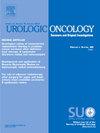A PHASE 1B TRIAL OF MASOFANITEN (EPI-7386) IN PATIENTS WITH METASTATIC CASTRATION-RESISTANT PROSTATE CANCER (MCRPC)
IF 2.4
3区 医学
Q3 ONCOLOGY
Urologic Oncology-seminars and Original Investigations
Pub Date : 2025-03-01
DOI:10.1016/j.urolonc.2024.12.005
引用次数: 0
Abstract
Introduction
Masofaniten (EPI-7386) is a next generation aniten, a novel class of compounds designed to inhibit androgen receptor (AR) activity by binding to the N-terminal domain. Preclinical data supports disruption of AR regulated gene transcription, even in the presence of resistance mechanisms including ligand-binding domain point mutations and truncated splice variants, as a strategy to inhibit prostate cancer growth. In the Phase 1a dose-escalation study (NCT04421222), treatment with EPI-7386 monotherapy was safe, well tolerated up to a daily dose of 1200 mg (600 mg BID), achieved target clinical exposures and showed preliminary signals of antitumor activity in heavily pretreated mCRPC. We report here the results of the Phase 1b dose expansion first-in-human trial of EPI-7386 in mCRPC.
Methods
This Phase 1b, open-label, multicenter, dose expansion trial was designed to evaluate the safety, pharmacokinetics, pharmacodynamics, and antitumor activity of EPI-7386 in mCRPC patients (pts) progressing on standard of care treatment, including next generation antiandrogens. Two cohorts were tested, examining the 600 mg BID and 600 mg QD dosing regimens. Circulating Tumor DNA (ctDNA) samples were also collected in the study at baseline and at cycle 4 to characterize the tumor genomic profile and quantify molecular response.
Results
12 pts were enrolled in the 600 mg BID cohort (median follow up 12 months) and 12 in the 600 mg QD cohort (median follow up 8 months). Pts in both arms had a median of 2 (range 1-3) lines of prior therapy for mCRPC: 71% in both cohorts received abiraterone and at least one second generation AR inhibitor (enzalutamide, darolutamide or apalutamide). EPI-7386 was safe and well tolerated at both dosing schedules. The majority of related adverse events (AEs) were grade 1 (47%), and grade 2 (41%). AEs were consistent with AEs associated with second-generation antiandrogens (i.e. anemia, fatigue and hypertension), and no differences were observed between EPI-7386 600 mg QD and BID dosing. As expected, 600 mg BID dosing resulted in higher PK parameters at steady state, with a mean AUC0-24 of 357,000 hr*ng/mL and a mean Clast of 14,500 ng/mL, in comparison to a mean AUC0-24 of 246,000 hr*ng/mL and a mean Clast of 7,120 ng/mL for the 600 mg QD cohort. Both dosing regimens resulted in exposures in the range of those associated with antitumor activity in preclinical models. Evidence of antitumor activity was observed in ∼1/3 of the patients in both cohorts. Notably, genomic characterization of ctDNA samples showed, beside the expected alterations in the AR pathway (AR mutations, amplifications, structural rearrangements), additional molecular alterations associated with disease aggression and lineage plasticity (P53 mut, PTEN deletion, RB1 deletion).
Conclusions
Data from the Phase 1 dose expansion portion of the first-in-human study with EPI-7386 monotherapy confirmed the favorable safety and tolerability profile of the drug together with the achievement of clinically relevant exposures by both doses/regimens tested. Clinically relevant anti-tumor activity was observed in both arms in a small subset of patients displaying fewer molecular alterations outside of the AR pathway. Based on these observations, the clinical development of masofaniten is now focusing on its combination with other AR pathway inhibitors (NCT05075577; NCT05295927; NCT06312670) in earlier lines of treatment for mCRPC in combination with standard of care AR inhibitors.
maofaniten (epi-7386)治疗转移性去势抵抗性前列腺癌(mcrpc)的1b期临床试验
masofaniten (EPI-7386)是新一代aniten,是一类通过结合n端结构域抑制雄激素受体(AR)活性的新型化合物。临床前数据支持破坏AR调节的基因转录作为抑制前列腺癌生长的策略,即使存在包括配体结合结构域点突变和截短剪接变异体在内的耐药机制。在1a期剂量递增研究(NCT04421222)中,EPI-7386单药治疗是安全的,耐受良好,每日剂量高达1200 mg (BID 600 mg),达到了目标临床暴露,并在重度预处理的mCRPC中显示出抗肿瘤活性的初步信号。我们在此报告EPI-7386用于mCRPC的1b期剂量扩展首次人体试验的结果。方法:本1b期、开放标签、多中心、剂量扩大试验旨在评估EPI-7386在标准护理治疗进展的mCRPC患者(包括下一代抗雄激素)中的安全性、药代动力学、药效学和抗肿瘤活性。对两个队列进行了测试,检查了600毫克BID和600毫克QD给药方案。循环肿瘤DNA (ctDNA)样本也在基线和周期4收集,以表征肿瘤基因组谱和量化分子反应。结果600 mg BID组12例(中位随访12个月),600 mg QD组12例(中位随访8个月)。两组患者既往治疗mCRPC的中位数为2(范围1-3)线:两个队列中71%的患者接受阿比特龙和至少一种第二代AR抑制剂(恩杂鲁胺、达罗卢胺或阿帕鲁胺)。EPI-7386在两种给药方案下均安全且耐受性良好。大多数相关不良事件(ae)为1级(47%)和2级(41%)。ae与与第二代抗雄激素(即贫血、疲劳和高血压)相关的ae一致,EPI-7386 600 mg QD与BID剂量之间无差异。正如预期的那样,600 mg BID剂量在稳态下导致更高的PK参数,平均AUC0-24为357,000 hr*ng/mL,平均Clast为14,500 ng/mL,而600 mg QD队列的平均AUC0-24为246,000 hr*ng/mL,平均Clast为7,120 ng/mL。在临床前模型中,这两种给药方案都导致了与抗肿瘤活性相关的暴露范围。在两个队列中,约1/3的患者有抗肿瘤活性。值得注意的是,ctDNA样本的基因组特征显示,除了AR途径的预期改变(AR突变、扩增、结构重排)外,还有与疾病侵袭性和谱系可塑性相关的额外分子改变(P53突变、PTEN缺失、RB1缺失)。EPI-7386单药治疗的第一项人体研究的1期剂量扩大部分的数据证实了该药物的良好安全性和耐受性,以及两种剂量/方案测试的临床相关暴露。临床相关的抗肿瘤活性在两组中观察到一小部分患者在AR通路外表现出较少的分子改变。基于这些观察结果,masofaniten的临床开发目前正专注于与其他AR通路抑制剂(NCT05075577;NCT05295927;NCT06312670)与标准治疗AR抑制剂联合用于mCRPC的早期治疗。
本文章由计算机程序翻译,如有差异,请以英文原文为准。
求助全文
约1分钟内获得全文
求助全文
来源期刊
CiteScore
4.80
自引率
3.70%
发文量
297
审稿时长
7.6 weeks
期刊介绍:
Urologic Oncology: Seminars and Original Investigations is the official journal of the Society of Urologic Oncology. The journal publishes practical, timely, and relevant clinical and basic science research articles which address any aspect of urologic oncology. Each issue comprises original research, news and topics, survey articles providing short commentaries on other important articles in the urologic oncology literature, and reviews including an in-depth Seminar examining a specific clinical dilemma. The journal periodically publishes supplement issues devoted to areas of current interest to the urologic oncology community. Articles published are of interest to researchers and the clinicians involved in the practice of urologic oncology including urologists, oncologists, and radiologists.

 求助内容:
求助内容: 应助结果提醒方式:
应助结果提醒方式:


